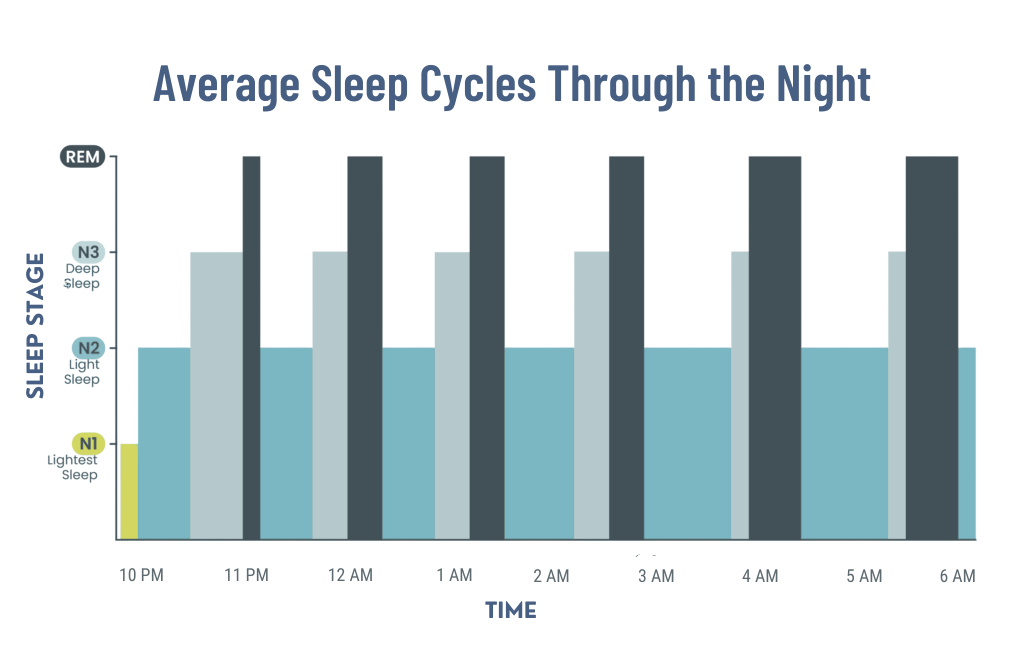If you’ve ever woken up at 2 a.m. wondering why you’re suddenly wide awake, you’re not alone—and you’re definitely not broken. In fact, waking up during the night is a completely normal part of human sleep. Let’s break the myth that healthy sleep means 7–9 uninterrupted hours and talk about what’s really happening when you stir at night.
The Science Behind Nighttime Wake-Ups
Sleep isn’t one long, steady stretch of unconsciousness. Instead, we cycle through five stages—light (N1), deeper (N2), deep (N3), back to N2, then REM—every 90–120 minutes NCBI.
- Deep (N3) sleep predominates in the first half of the night. Early in the evening you may spend 20–40 minutes in each deep-sleep bout; by the second half of your sleep period, these N3 episodes shrink dramatically, and deep sleep all but disappears Sleep Foundation.
- REM and lighter sleep both lengthen as the night goes on—especially after 3–4 hours of sleep—so toward morning you’re naturally in shallower, more easily disrupted stages Sleep Foundation.
Meanwhile, your cortisol (the stress-hormone that helps you wake) follows its own 24-hour rhythm: levels hit their lowest around midnight, then begin rising at about 3 a.m., climbing steadily to a peak in the early morning (8–9 a.m.) That hormonal uptick, combined with spending more time in lighter sleep/REM, makes you more prone to brief awakenings—exactly when you often feel like you “can’t sleep,” even though your body still needs rest.
When Normal Wake-Ups Become a Problem
The real issue isn’t whether you wake up—it’s whether you can fall back asleep.
If you’re lying awake for 20 minutes or more, tossing and turning or reaching for your phone, you risk training your brain to associate your bed with wakefulness. Over time, that can lead to fragmented sleep, fatigue, and frustration.
Tips to Fall Back Asleep Faster
If you wake up in the middle of the night, here’s what to do:
✅ Stay calm – Remind yourself this is normal. Anxiety about not sleeping can actually make it harder to return to sleep. ✅ Adjust your comfort – Fix your blanket, fluff your pillow, roll to your side. Often, minor discomfort is the culprit. ✅ Breathe or meditate – Try slow, deep breathing or a simple body-scan to relax your nervous system. ✅ Limit clock-watching – Looking at the time only adds pressure. Turn your clock away from you if needed.
And here’s what not to do:
🚫 Don’t reach for your phone – The blue light disrupts melatonin production, and reading emails or scrolling social media wakes up your brain. 🚫 Don’t get up unless you have to – If you’re truly wide awake for 20+ minutes, consider getting out of bed and reading in low light—but avoid bright screens or stimulating tasks. 🚫 Don’t catastrophize – One rough night won’t ruin your health. Sleep is resilient. Keep the long-term view in mind.
Normalizing the Wake-Up
Our modern expectations of sleep—completely uninterrupted and always refreshing—don’t match how our biology works. Historically, segmented sleep was even more common, with people waking for an hour or two in the middle of the night for quiet reflection or reading.
Today, the key is not to fear waking up, but to have tools to return to rest without stress.
Got your own tips for handling those 3 a.m. awakenings? Share them below—and let’s keep normalizing realistic, healthy sleep together.
#SleepHealth #Wellness #CircadianRhythms #Productivity #SleepBetter #LiveBetter

